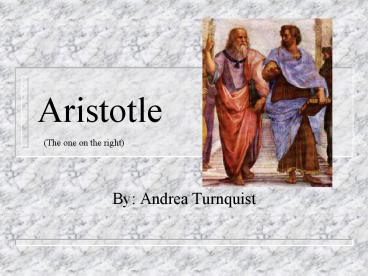Aristotle - PowerPoint PPT Presentation
1 / 14
Title:
Aristotle
Description:
His father, Nichomachus, was a physician tot he Macedonian royal family and ... fish and whales and dolphins; proved that whales and dolphins are not fish ... – PowerPoint PPT presentation
Number of Views:138
Avg rating:3.0/5.0
Title: Aristotle
1
Aristotle
(The one on the right)
- By Andrea Turnquist
2
His Life
- Aristotle was born in 384 B.C, in the city of
Stagira , Greece - His father, Nichomachus, was a physician tot he
Macedonian royal family and taught Aristotle
medicine - In 367 B.C, Aristotle was sent to Athens to study
philosophy with Plato, at his academy - He stayed at the Academy until 347 B.C
3
More
- He was a brilliant pupil, but he was opposed to
some of Platos teachings. As a result, when
Plato died, Aristotle was not appointed head of
the academy - Aristotle left Athens and traveled to many
different places, such as present day Turkey
studying biology - He returned to Macedonia in 338 B.C, to tutor
Alexander the Great, and he set up his own
academy, called the Lyceum
4
Even more
- After Alexanders death, Aristotle was forced to
flee Athens to the Island of Euboea, where he
died in 322 B.C
5
What he Accomplished
- Aristotle is said to have written over 150
philosophical treatises, the subjects ranging
from biology to physics to morals to politics to
aesthetics - the passage on the next slide tell a summery of
the contributions that Aristotle made to the
mathematical and philosophical world
6
Whereas Aristotle's teacher Plato had located
ultimate reality in Ideas or eternal forms,
knowable only through reflection and reason,
Aristotle saw ultimate reality in physical
objects, knowable through experience. Objects,
including organisms, were composed of a
potential, their matter, and of a reality, their
form thus, a block of marble -- matter -- has
the potential to assume whatever form a sculptor
gives it, and a seed or embryo has the potential
to grow into a living plant or animal form. In
living creatures, the form was identified with
the soul plants had the lowest kinds of souls,
animals had higher souls which could feel, and
humans alone had rational, reasoning souls. In
turn, animals could be classified by their way of
life, their actions, or, most importantly, by
their parts.
From http//www.ucmp.berkeley.edu/history/aristot
le.html
7
More of what he accomplished
- Even though his philosophies were not w/o errors,
they were some of the greatest biological
synthesis of all time - They remained the ultimate authority among people
for centuries after his death - He observed and discovered many things about the
world and biology years before anyone else, such
as the anatomy of the octopus, cuttlefish,
crustaceans and other sea animals
8
Cont
- He discovered the difference between fish and
whales and dolphins proved that whales and
dolphins are not fish - He described the embryological development of a
chick the social organization etc. of bees - His classification system of animals had two
groups those w/blood and those w/o blood
9
Ce sont plus
- The animals w/blood had five different
genera-mammals, birds,amphibians, fishes, and
whales - The animals w/o blood were classified as
cephalopods,crustaceans, insects,shelled animals
and zoophytes or plant animals - Aristotle also had treatises on Earth Sciences as
well (cont on next slide)
10
Oui, cest bien!
- He called his treatise Meteorology but he defined
it as "all the affections we may call common to
air and water, and the kinds and parts of the
earth and the affections of its parts. - He worked out the hydrologic cycle too. "Now the
sun, moving as it does, sets up processes of
change and becoming and decay, and by its agency
the finest and sweetest water is every day
carried up and is dissolved into vapor and rises
to the upper region, where it is condensed again
by the cold and so returns to the earth."
11
You know
- He also discusses winds and Earthquakes (he
thought that Earthquakes were caused by
underground winds), Thunder, Lightning, rainbows
meteors, comets, and the Milky Way (which he
thought had something to do w/ the atmosphere) - On the next few slides are quotes from his
philosophies about the Earth
12
quotes
- The same parts of the earth are not always moist
or dry, but they change according as rivers come
into existence and dry up. And so the relation of
land to sea changes too and a place does not
always remain land or sea throughout all time,
but where there was dry land there comes to be
sea, and where there is now sea, there one day
comes to be dry land. But we must suppose these
changes to follow some order and cycle. The
principle and cause of these changes is that the
interior of the earth grows and decays, like the
bodies of plants and animals. . . .
13
More quote
- But the whole vital process of the earth takes
place so gradually and in periods of time which
are so immense compared with the length of our
life, that these changes are not observed, and
before their course can be recorded from
beginning to end whole nations perish and are
destroyed.
14
THE END
- Aristotle was one of the greatest thinkers his
time and of all time when his work was
rediscovered in the medieval times, his followers
called him The philosopher or The master of
those who know































